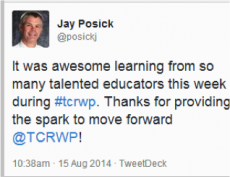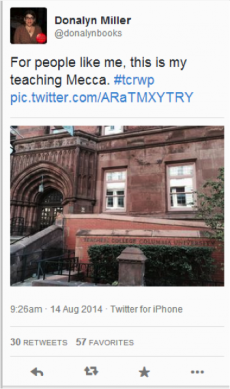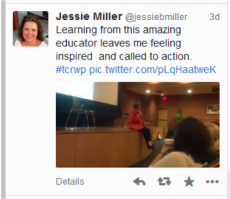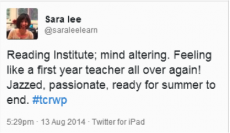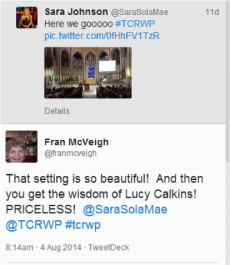Summer Institutes
Dates for 2020:
June Writing Institute: June 22-26, 2020
June Reading Institute: June 29 - July 3, 2020
July Writing Institute: July 13 - 17, 2020
July Reading Institute: July 20 - 24, 2020
August Writing Institute: August 3-7, 2020
August Reading Institute: August 10-14, 2020
Applications for TC Summer Institutes will open February 26, 2020.
2020 Summer Institute Brochure
For over 30 years, educators have come together at Teachers College for summer institutes on the teaching of reading and writing. Well over 170,000 teachers have attended our week-long institutes.
Together, staff developers at the Project and educators from across the globe study methods and plan curricula, revitalize our thinking, and most importantly, encourage our students to lead rich and literate lives. Many educators have told us that they regard these institutes as a continual source of professional renewal and education. During the school year, many institute participants continue to study with staff developers in their schools and return to TC for conferences conducted by leading literacy experts and children’s book authors.
We offer two five-day institutes on the Teaching of Reading and two five-day institutes on the Teaching of Writing. The reading and writing institutes are taught back to back, first in June/July and then again in August. These institutes are designed for educators, classroom teachers, school administrators and curriculum specialists who are committed to turning classrooms into richly literate reading and writing workshops.
The following is a partial list of some of the topics studied at each of the Institutes:
Writing Institute Highlights
- Teaching that fosters independence and a growth mindset in student writers
- Genre studies in writing essays, narratives, research-based arguments, and informational texts
- Developing classroom and school cultures that value self-assessment
- Teaching reading in the writing workshop
- Assessment-based small group instruction
- Content area writing
- The relationship between global standards and the teaching of writing
- Using interactive writing and other components of balanced literacy to scaffold writing skills
- Using performance assessments and learning progressions to accelerate progress
- Using toolkits, charts, and student-facing rubrics to support writers in revision
- Using mentor texts to lift the level of student work
- Working with writing partnerships
- Teaching students to transfer word study knowledge into writing
- Teaching source-based information and argument writing
- Literary essays and text-based writing
- Using technology to enhance the research and writing process
Reading Institute Highlights
- The central role of curriculum development in the teaching of reading
- Units of Study in the reading workshop
- Aligning reading instruction to global standards
- Comprehension strategy instruction
- Phonics as an integral component of early literacy
- Developing classroom and school cultures that value self-assessment and setting challenging goals
- Accountable talk as a vehicle for teaching comprehension
- Teaching interpretation, critical reading, synthesis, and main idea
- Interpretation book clubs
- A trajectory of minilessons for supporting foundational skills
- Using formative assessments and learning progressions to plan for instructional next steps
- Classroom structures that support inquiry and collaboration
- Assessment-based small group instruction
- Supporting cross-textual work in nonfiction
- Reading across the curriculum
- Writing about reading


